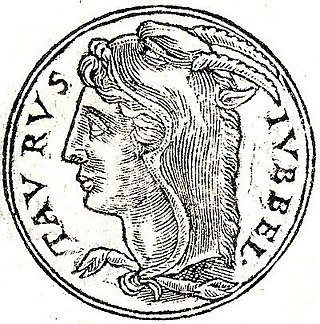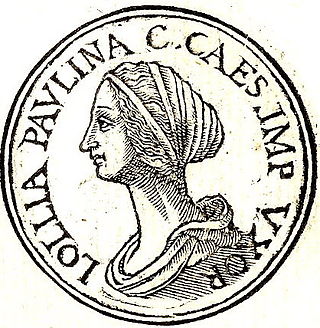Related Research Articles

Antonia the Elder was a niece of the first Roman emperor, Augustus, being the eldest daughter of Octavia the Younger and her second husband, the Triumvir Mark Antony. She married Lucius Domitius Ahenobarbus and became the paternal grandmother of the emperor Nero.

The gens Valeria was a patrician family at ancient Rome, prominent from the very beginning of the Republic to the latest period of the Empire. Publius Valerius Poplicola was one of the consuls in 509 BC, the year that saw the overthrow of the Tarquins, and the members of his family were among the most celebrated statesmen and generals at the beginning of the Republic. Over the next ten centuries, few gentes produced as many distinguished men, and at every period the name of Valerius was constantly to be found in the lists of annual magistrates, and held in the highest honour. Several of the emperors claimed descent from the Valerii, whose name they bore as part of their official nomenclature.
Marcus Valerius Messalla Messallinus was a Roman senator who was elected consul for 3 BC.
Lucius Cornelius Sulla was a Roman senator of the Augustan age. He was ordinary consul as the colleague of Augustus in 5 BC. The only other office attested for him was as a member of the Septemviri epulonum, which he was co-opted into after his praetorship.

Lucius Volusius Saturninus was a Roman senator from the powerful plebeian Volusia gens, or family. He held several offices in the emperor's service. Saturninus attracted the attention of his contemporaries for his long life: he died at the age of 93, and having sired a son at the age of 62.
Faustus Cornelius Sulla was a Roman senator who lived during the reign of the emperor Tiberius. He was suffect consul in AD 31 with Sextus Tedius Valerius Catullus as his colleague. Faustus was the son of Sulla Felix, a member of the Arval Brethren who died in AD 21, thus a direct descendant of the dictator Sulla. His mother was Sextia and his brother was Lucius Cornelius Sulla Felix.
The gens Aelia, occasionally written Ailia, was a plebeian family in Rome, which flourished from the fifth century BC until at least the third century AD, a period of nearly eight hundred years. The archaic spelling Ailia is found on coins, but must not be confused with Allia, which is a distinct gens. The first member of the family to obtain the consulship was Publius Aelius Paetus in 337 BC.

Titus Statilius Taurus was the name of a line of Roman senators. The first known and most important of these was a Roman general and two-time consul prominent during the Triumviral and Augustan periods. The other men who bore this name were his descendants.

The gens Lollia was a plebeian family at Rome. Members of the gens do not appear at Rome until the last century of the Republic. The first of the family to obtain the consulship was Marcus Lollius, in 21 BC.
Claudia Marcella Minor (PIR2 C 1103, born some time before 39 BC) was a niece of the first Roman emperor Augustus. She was the second surviving daughter of the emperor's sister Octavia the Younger and her first husband Gaius Claudius Marcellus. Marcella had many children by several husbands, and through her son Marcus Valerius Messalla Barbatus she became the grandmother of the empress Messalina.

The gens Maria was a plebeian family of Rome. Its most celebrated member was Gaius Marius, one of the greatest generals of antiquity, and seven times consul.
Marcus Valerius Messalla Rufus, was a Roman senator who was elected consul for 53 BC.
Gnaeus Calpurnius Piso was a high ranking Roman aristocrat and senator. He was firmly traditionalist and opposed the populist First Triumvirate, and later Julius Caesar. He fought against Caesar in the Caesar's civil war and against his adopted son, Octavian, in the Liberators' civil war; both times on the losing side.
Sextus Pompeius was a Roman senator who lived during the 1st century BC and into the 1st century AD. He appeared to have a witty character and to be very intelligent. Sextus was a patron of literature and the Roman poet Ovid addressed to him four poems when he was living in exile. These poems were collected in the fourth book of Epistulae ex Ponto.
Publius Silius was a Roman senator active during the reign of the emperor Augustus. He was suffect consul in AD 3, replacing Lucius Aelius Lamia; his colleague was Lucius Volusius Saturninus.
Lucius Cornelius Pusio Annius Messala was a Roman senator who replaced the emperor Domitian as suffect consul from 13 January 90 to the end of February. He is also known by the shorter form of his name, Lucius Cornelius Pusio.
Aulus Licinius Nerva Silianus was a Roman senator who was active during the Principate. He was consul in AD 7 as the colleague of Quintus Caecilius Metellus Creticus Silanus. Silianus was born the second of three sons of Publius Silius Nerva, consul in 20 BC, and was later adopted by Aulus Licinius Nerva. Velleius Paterculus salutes him for his simplicissimus.

The gens Sentia was a plebeian family at ancient Rome. Members of this gens are first mentioned in history toward the end of the Republic. The first of the Sentii to obtain the consulship was Gaius Sentius Saturninus, in 19 BC.
The gens Silia was a plebeian family at ancient Rome. Members of this gens are mentioned as early as the fifth century BC, but first to hold the consulship was Publius Silius Nerva, in the time of Augustus. The Silii remained prominent until the time of the Severan dynasty, in the early third century.